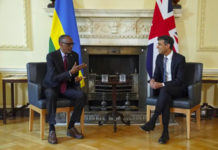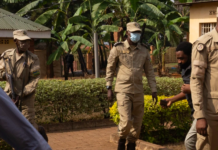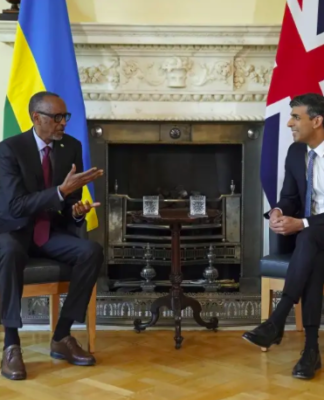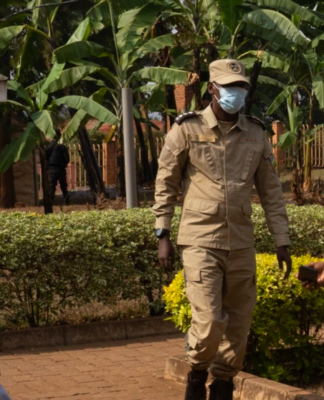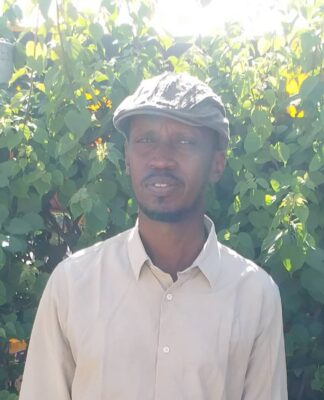Excellencies Heads of State,
Excellencies Heads of Government,
Excellencies Representatives of African Governments,
Kigali, July 9, 2016
Your Excellencies,
Distinguished delegates,
The political opposition platform composed of the following political organisations, namely Amahoro PC, FDU – Inkingi, PDP – Imanzi, PS – Imberakuri and Rwanda National Congress (RNC) would like to welcome you to Rwanda and to express its hope that you will learn a bit more about Rwanda and be in a position to help Rwandans avoid another cycle of political violence as the factors that have led to each one of them are more prevalent than ever before. We are very pleased to offer some glimpses of the real life experience in Rwanda, different from Rwanda made in London, for export, by expensive Public Relations Firms[i].
Our opposition platform is composed of political organisations whose membership include people who have lived and worked in Rwanda all their lives but are now refugees, former refugees, some of whom held senior positions in the RPF government and are now refugees again, survivors of genocide who are now refugees and many Rwandans who are living in Rwanda but cannot come out publicly to oppose the government to save their skin.
We are sure and are glad that you will get the legendary hospitality of Rwandans. You will see a clean and orderly city, but you may never know the cost of impressing foreign visitors. Street vendors, sex workers, beggars, homeless people, and suspected petty criminals are forcefully collected as refuse from the streets of Kigali and dumped in centres, one in Gikondo – Kigali and other places away from the eyes of foreign visitors. According to Human Rights Watch “they are routinely beaten, humiliated, extorted, or punished for trivial actions such as talking too loudly or not forming an orderly line for the toilets”. We hope that no human life will be lost in the cleaning up exercise of the city as it happened ahead of the World Economic Forum on Africa meeting (11 – 13 May 2016). On the 7th of May 2016, a 28 – year old lady, Ms Mahoro (meaning peace in English) was beaten to death for being a street vendor. In addition, people without shoes are not allowed into the city.
Because of your very tight programme, you might not have the time, like Prof Ghai[ii] who headed the delegation of the Commonwealth Human Rights Initiative to Rwanda in 2009, to realise that “beneath the gentility of RPF leaders, the tidiness of Kigali, and its gleaming high rise buildings, I found a country deeply fragmented, operating under the hegemony of small Tutsi political elite, which rules through oppression and fear” adding , “excellent public relations machinery has succeeded in hiding the exclusionary and repressive nature of the regime”.
As the report (July 2000) of the International Panel of Eminent Personalities to investigate genocide in Rwanda and surrounding events, chaired by Sir Quett Ketumile Joni Masire, former President of Botswana (para 23.59) rightly observed: “Rwanda is unlikely ever to be an ethnic-free nation, but this need not be a cause for despair. Diversity, properly appreciated, strengthens a society, and unity in diversity is the mark of a strong nation. We believe Rwandans should acknowledge ethnicity for what it is legitimate, value-free distinctions between groups of people who share and accept a larger identity in common. There can be Rwandan Hutu and Rwandan Tutsi and Rwanda Twa without ascribing superior or inferior value implications to those groupings”. The report rightly adds that “recognition of ethnic differences is different from prejudice” or promoting divisionism as the current regime makes believe. The report further pointed out that “tragedy occurs when unscrupulous demagogues emerge who turn innocent distinctions among peoples of differing ethnic backgrounds into overriding political divisions”.
Our political platform fully endorses this analysis and is part of its core values. It is the very considered view of the platform that the cycle of violence that has bedevilled Rwanda is not a product of congenital hatreds between ethnic groups but the exploitation of group grievances by “unscrupulous demagogues” for political ends.
Our political platform is quite concerned that there are enough societal grievances along ethnic lines that can be exploited by political opportunists and our efforts as people from the various ethnic groups and experience, is to pre-empt another political violence. These grievances include:
- Social and political exclusion; according to the UCLA sociologist Andreas Wimmer, Rwanda has the third-highest level of political exclusion in the world (behind Sudan and Syria);
- Lack of an independent legislature and judiciary, the media, politically active parties and civil society groups to play a stabilising role as formal channels for national debate and peaceful political competition;
- Lack of political participation and of mechanism for peaceful transfer of power;
- Horizontal economic disparities patterned along ethnic lines. According to UNDP Human Development Index Report (2007) which was jointly published with the Rwandan government as a blueprint of “turning vision 2020 into reality «pointed out “Rwanda’s high growth rates are deceptive in that they hide large and growing inequalities between social classes, geographic regions and gender”. The report reveals that economic inequalities, have almost doubled in the last 20 years, placing Rwanda among the top 15% most unequal countries in the world [iii];
- Aggressive foreign policy and destabilisation of the region. Almost all the neighbours of Rwanda i.e. Tanzania, Burundi, and the DRC has cold or hostile relations with the Rwandan regime. There is UN incontrovertible evidence that the Rwandan regime finances proxy rebel groups in the DRC, acts of destabilisation of Burundi and threats to former President of Tanzania, HE Kikwete for suggesting talks with the armed opposition.
- Deep seated unresolved grievances around equitable justice and false narrative of the Rwandan tragedy. The regime has exploited a national tragedy, genocide against Tutsi as blank cheque to act with impunity and as the OAU commissioned panel of eminent personalities mentioned the Rwandan army has become an “army without borders” that strike anywhere, countries like individuals in alleged pursuit of genocidaires or critics who threaten national security. The blatant cases relate to assassinations or attempted assassinations of critics of the government abroad including in South Africa (murder of former chief spy, attempts to assassinate former chief of staff, General Kayumba Nyamwasa, Kenya, Mozambique, Cameroon, UK) etc;
- Impunity: On October 1, 2010, the UN Office of the High Commissioner for Human Rights published a report mapping the most serious violations of human rights and international humanitarian law committed in the Democratic Republic of Congo between March 1993 and June 2003 highlights among other things crimes committed against Rwandan Hutu refugees and Congolese Hutu. According to the report “the apparent systematic and widespread attacks described in this report reveal a number of inculpatory elements that, if proven before a competent court, could be characterized as crimes of genocide [iv]. In 2001, another United Nations report, on the Illegal Exploitation of Natural Resources and Other Forms of Wealth of the Democratic Republic of the Congo, specifically pointed to the responsibility and profiteering of Kagame and his associates in the illegal exploitation of DRC natural resources.
- Problems of refugees. Rwanda has the highest number of refugees in its history comprising all professions, social status and ethnicity.
As one political analyst observed the regime “has played on the conscience of the world to silence dissent, crush critics and devastate its neighbour in a conflict that has left more people dead than any war since the Second World War” [v].
The report of the Commonwealth Human Rights Initiative 2009, was again forthright in pointing out that the Rwandan regime “uses the constitution opportunistically as a façade, which hides the exclusionary and repressive nature of the regime; relies on power structures that sometimes run parallel to, and sometimes cross-cuts, the formal government; and in which the army plays a central role.
The Rwandan political opposition platform believes therefore the Rwandan problem is political and deserves a political solution. Indeed, the panel of experts, which was led by no other than the former President of Botswana held in the same view 16 years ago and had recommended a political framework conducive to peace and stability in Rwanda. It had recommended among other things that:
“Before the general election scheduled for the year 2003, the Rwandan government should establish an independent African or international commission to devise a democratic political system based on the following principles: the rule of the political majority must be respected while the rights of minorities must be protected; governance should be seen as a matter of partnership among the people of Rwanda; and the political framework should take into account such variables as gender, region, and ethnicity” and added that “other public institutions such as the military, the police, and the justice system should be organized on the basis of merit, taking into account where appropriate these same principles. Our political platform has called for a highly inclusive national dialogue to discuss all legal and political arrangements that protect and reassures everyone.
However, as some political analysts, quoted in the report, predicted in 2000: “the Kigali government is implementing a policy of total control of state and society.” Power is concentrated in the hands of “a small RPF elite”; opposition is being destroyed; and an effective security apparatus is being developed. “In this way, Rwanda is increasingly becoming an army with a state rather than a state with an army.” This objective has been achieved in 16 years down the line. President is able to get any score he wishes in an election.
The recommendation was ignored and the polls were held in 2003 and President Kagame got more than 90% of the vote.
The AU Country Review Report of the Republic of Rwanda 2006 by African Peer Review mechanism pointed out the following with regard to Political competition:
- In paragraph 102, “conditions for a healthy competition for power including adequate guarantees of equity of access to the political space for all contending political organisations at all administrative levels and a political environment sufficiently liberal to afford equal chance for all individuals appropriately qualified, to compete for political office”, were lacking;
- In paragraph 103, it observed that although the principle of political pluralism or systems of constitutional democracy is well entrenched in the Constitution, political parties as such are not able to operate freely. And that while the Rwandan Constitution guarantees freedom to form, join and belong to political parties, it “simultaneously undermines that freedom by attaching onerous conditions, such as political parties not being able to operate at the grassroots below the provincial levels which effectively “amounts to a denial of much political activity to citizens, as most people reside at the district, sector and cell levels”. It also pointed out that competitive political pluralism was consciously contained within clearly defined guidelines by the Consultative Forum of Political Organisations”. The political space has been shrinking since 2003;
- In the run up to the 2010 presidential elections, the government suspended two popular independent newspapers, Umuseso and Umuvugizi, described by the New York-based Committee to Protect Journalists as ‘the only critical media voices left in the country’. Jean-Leonard Rugambage, a journalist working for the banned newspaper Umuvugizi was gunned down; his colleague who had fled to Uganda survived kidnapping. Thanks to a swift intervention of Ugandan security services. The editor of Inyenyeli newspaper was not so lucky, as he was gunned down in Kampala on 1st December 2011.
A second presidential hopeful, Bernard Ntaganda, President of PS – imberakuri was put in prison on four charges, including terrorism. The Vice President of the Green Party was murdered in dubious circumstances. The President of the Party run into exile. Mrs Victoire Ingabire Umuhoza, chairperson of the leading opposition Party United Democratic Forces (FDU – Inkingi), was arrested and charged with genocide denial. The Party was denied the right to register in the 2010 elections. She is now being sentenced to 15 years in jail. Deogratias Mushayidi, President of PDP – Imanzi was also jailed.
Mrs Victoire Ingabire Umuhoza appealed to the African Court of Human and Peoples’ Rights (ACHPR). Two days prior to the hearing on 4 March 2016 by the African Court of Human and Peoples’ Rights (ACHPR), the Rwandan Government notified the court that it would not appear before it. The treatment of Mrs Victoire Ingabire renders hollow the much lauded of policy of women empowerment in Rwanda. Women who are elected or fill the unelected required quotas set by the government are picked – for purposes of political expediency, as the selection depends on their loyalty to the ruling party RPF, rather than their competence.
Rwanda has become virtually one party state. Just to mention a few laws: article 451 criminalizes the action of spreading false information with intent to create a hostile international opinion against the Rwandan State. People found guilty of this offence face up to 10 years in prison in peacetime and life imprisonment during wartime. The definition is vague and has come to mean criticizing government policy; article 463 defines as inciting insurrection the actions of: spreading rumours, exciting the population against the established Government, inciting or attempting to incite citizens against each other or, attempting to alarm the population with intention to cause trouble in the country. A person found guilty of inciting insurrection is liable to a term of imprisonment of 10 to 15 years. Any information that does to validate government information is taken as a rumour and punishable. Many critics in jail are in jail under these laws.
How far this law can be stretched is glaring in the case of seven women and one man, arrested in July 2013 outside Kagame’s home, member of a sect called The Inseparable Heroes of Jesus and Mary, who hoped to pass on a message, allegedly received from God, that criticized his leadership. The prosecution told the court that one of them was heard saying that “the president and his government are dictatorial and, if they don’t stop, there will be more bloodshed than in the genocide.”
This crackdown is happening with impunity while the African Union has clearly acknowledged that democracy, good governance and human rights are prerequisites to peace and development. The African Charter on democracy, elections and good governance states in article 2 that one of the objectives of member states is to: “nurture, support and consolidate good governance by promoting democratic culture and practice, building and strengthening governance institutions and inculcating political pluralism and tolerance”. NEPAD declaration on Democracy, Political, Economic and Corporate Governance also emphasizes a commitment by member states to ensure “individual and collective freedoms, including the right to form and join political parties and trade unions, in conformity with the constitution”.
We are very convinced that only a democratic system of government and the rule of law can bring durable peace and development to Rwanda and to the Great Lakes Region.
We are appealing to your Excellencies and distinguished delegates to do everything in your power to bring the Rwandan Government to implement the recommendations of International Panel of Eminent Personalities that was appointed by the OAU and to respect the UN and AU conventions it has signed including the UN convention on political and civil rights and the African Charter on democracy, elections and good governance. This is the only way to bring durable peace and development.
As the UN Special Rapporteur on the rights to freedom of peaceful assembly and of association, Maina Kiai pointed out in his June 2014 address to the Human Rights Council, saying that “a society without room for critical voices to speak freely and peacefully is unsustainable” and highlighted the fact that “the fear of a new genocide cannot be invoked to impede fundamental freedoms in any society, which in fact are necessary to prevent conflicts and genocide”. The institute’s Global Peace Index Report for 2015 on the trend of peace in the world ranks Rwanda 139th out of 162, which contradicts official accounts that it is among the most peaceful.
The African Union has a stake in pre-empting another humanitarian disaster in Rwanda and also stabilising the whole of the Great Lakes region, long destabilised by the aggressive foreign policy of the Rwandan regime. Silence over the looming disaster is tantamount to complicity.
In particular, we request the AU to bring Rwanda to accept an all-inclusive national dialogue with the opposition and other stakeholders in order to discuss a political framework that can bring durable peace and development in Rwanda as recommended 16 years ago by the International Independent Panel of Experts appointed by the OAU, predecessor to AU.
Please accept, your Excellencies, the assurances of my highest considerations.
Jerome Nayigiziki
Chair Platform
Washington DC
+1 (956) 337 – 7665
Annexes
July 09 2016 – Letter P5 to AU
July 09 2016 – Letter P5 to AU
[i] Tony Blair Firm earns Rwanda branding bid. http://www.thesundaytimes.co.uk/sto/news/uk_news/National/article1202399.ece; [i] Robert Booth: How London became the world capital of reputation laundering (Guardian 3 August 2010)
[ii] Prof Ghai, a distinguished scholar of constitutional law, human rights and democracy,
[iv] DRC: Mapping human rights violations 1993-2003: point 517
[v] Ian Birrell: The dark shadows that stain the new darling of Africa www.independent.co.uk/opinion/commentators

